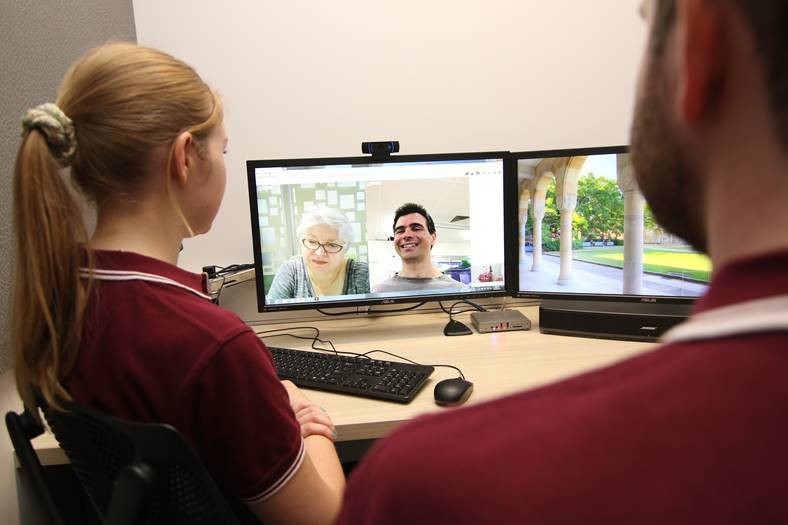New technologies for recovery science in the digital era
Future of Health co-lead and MBA Director Dr Nicole Hartley was recently featured in a podcast alongside UQ’s Department of Physiotherapy Professor Trevor Russell discussing the complementary research angles of technology in service, telehealth and physiotherapy. Arising from their collaborative research, they discussed the practicalities of embracing new technologies for recovery science in the digital era. In conversation with a physical therapist in the United States, Mr Jimmy McKay, who founded PT Pintcast in 2014, Dr Hartley commented on her research experiences in collaborating with online healthcare providers to understand how patient outcomes can be improved through the use of technology.
Research in the digital health space, how to use technology – either off the shelf or specifically developed – to deliver better healthcare, and to patients in the home – is increasingly popular. Dr Hartley discussed the implementation and usage of technology to sustain health over a longer period of time. Commenting on the role of technology for aging populations, Dr Hartley stated that technology has a transformative capacity for people with specific diseases such as chronic obstructive pulmonary disease (COPD) who are typically much older, and could use gamification as a way to connect with their grandchildren and build in a focus on being well.
Noting the link between this research and customer value creation, Dr Hartley explained: “What we call that is customer value – the value can mean completely different things. If it’s the value of how an elderly person wants to connect with their grandchildren, then they can do that. If it’s value in the fact that they don’t have to get in their car and drive all the way to the hospital every week for treatment of their diabetes, then that’s value.”
 Professor Russell highlighted that understanding the barriers to telehealth uptake, is key. This is seen through a business research lens, whether it be reviewing the technology acceptance model and anxieties traditionally viewed about technology, versus today where technology is increasingly ubiquitous. For practitioners, he noted that physiotherapists must understand what they are trying to achieve in delivering a service to their patients, to choose a technology that is fit for purpose. Given that physiotherapy is typically a manual ‘hands-on’ profession, the specific technology must be matched with the care to be delivered. This also needs to be matched to the particular client type. Noting the outcomes of some RCT’s for example, Professor Russell found that clinical outcomes for patients are not different from face-to-face care, highlighting that physiotherapists can overcome the digital barrier of physical separation.
Professor Russell highlighted that understanding the barriers to telehealth uptake, is key. This is seen through a business research lens, whether it be reviewing the technology acceptance model and anxieties traditionally viewed about technology, versus today where technology is increasingly ubiquitous. For practitioners, he noted that physiotherapists must understand what they are trying to achieve in delivering a service to their patients, to choose a technology that is fit for purpose. Given that physiotherapy is typically a manual ‘hands-on’ profession, the specific technology must be matched with the care to be delivered. This also needs to be matched to the particular client type. Noting the outcomes of some RCT’s for example, Professor Russell found that clinical outcomes for patients are not different from face-to-face care, highlighting that physiotherapists can overcome the digital barrier of physical separation.
What does this mean for the Future of Health?
Citing examples of providing telehealth interventions for patients on a waitlist for spinal rehabilitation, Professor Russell explained how the future of health lies in harnessing the capacity of these technologies which can be facilitated through online physical therapy. PT’s and occupational therapists, pain management teams and other providers can deliver care directly into the patients’ home by prescribing exercises, teaching them how to mobilise themselves better and thereby improve their overall health and wellbeing. Dr Hartley highlighted the need for culture change and the adoption by practitioners of technology in furthering this goal.
As Dr Hartley explains, from a consumer or patient perspective, for the future of health this involves monitoring your own health.
“The fact is now, in cocreating [healthcare] with your practitioner, through technology, you can look after yourself in your home. Whether suffering from a chronic disease or something long-term, we can co-create and develop a treatment plan. It’s about using technology in a way that helps you monitor yourself”.
Dr Hartley and Professor Russell are currently the recipients of several grants in this research stream, including a UQ Faculty of Health and Behavioural Sciences and Metro North Hospital and Health Sciences (CISS) Research Collaboration Seeding Grant, for a project investigating “Development of an active video game for the long-term maintenance of exercise of people with COPD”, alongside colleagues Dr Allison Mandrusiak and Jennie Money, and an NHMRC grant investigating “Home Telehealth Adoption in the Aging Population: Consumer Perspectives” alongside Professor Deborah Theodoros, Professor Nicole Gillespie, Professor Len Gray and Dr Anne Hill.
As of June 2019, PT Pintcast has been heard in 158 countries more than 1.6 million times. The podcast is available for streaming and download.
